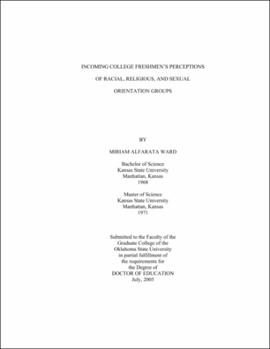| dc.contributor.advisor | Mokhtari, Kouider | |
| dc.contributor.author | Ward, Miriam Alfarata | |
| dc.date.accessioned | 2013-11-26T08:34:59Z | |
| dc.date.available | 2013-11-26T08:34:59Z | |
| dc.date.issued | 2005-07 | |
| dc.identifier.uri | https://hdl.handle.net/11244/7612 | |
| dc.description.abstract | Scope and Method of Study: The purpose of this study was to describe incoming college freshmen's perceptions of racial, religious, and sexual orientation groups. Degree of association incoming college freshmen have with these groups and sources of information that influence perceptions were studied. Five hundred thirty-eight incoming college freshmen, most being 18 and 19 years old, participated in the study. Participants completed, a five-part instrument requesting demographic information, self-generated and self-coded descriptors for groups, and Likert-type scales indicating both degree of association with groups and impact of likely sources that influence perceptions. Content analysis, descriptive statistics, Chi Square, and Ordered Logistic Regression were used for analysis. | |
| dc.description.abstract | Findings and Conclusions: This study revealed six important findings. First, Descriptors used by participants to portray groups most often referenced personal characteristics or personality traits of targeted group members. Second, participants reported positive perceptions for Asian, Hispanic, Caucasian, African American, American Indian, Catholic, Protestant, and Jewish groups. Third, positive perceptions of groups were more frequently associated with female participants and with participants who had had some association with the group. Fourth, the extent of association between participants and targeted groups tended to reflect the identified predominant campus racial and religious population and varied from minimal association with Muslims to much association with Caucasians. Fifth, "lack of opportunity to interact" was the most frequently cited reason for not associating with groups. Sixth, perceptions were most influenced by personal contact with a member of the group and by participant's family members and participant's friends. Findings from this study can provide a springboard for campus leaders who wish to increase student acceptance of people from diverse cultures. Acceptance has the potential to advance cultural understanding and to contribute to positive campus climates which can enhance student recruitment, academic and social success of students, and student retention. | |
| dc.format | application/pdf | |
| dc.language | en_US | |
| dc.rights | Copyright is held by the author who has granted the Oklahoma State University Library the non-exclusive right to share this material in its institutional repository. Contact Digital Library Services at lib-dls@okstate.edu or 405-744-9161 for the permission policy on the use, reproduction or distribution of this material. | |
| dc.title | Incoming college freshmen's perceptions of racial, religious, and sexual orientation groups | |
| dc.contributor.committeeMember | Montegomery, Diane | |
| dc.contributor.committeeMember | Walker, Barbara | |
| dc.contributor.committeeMember | Yellin, David | |
| dc.contributor.committeeMember | Sheorey, Ravi | |
| osu.filename | Ward_okstate_0664D_1456.pdf | |
| osu.accesstype | Open Access | |
| dc.type.genre | Dissertation | |
| dc.type.material | Text | |
| thesis.degree.discipline | Curriculum and Instruction | |
| thesis.degree.grantor | Oklahoma State University | |
